活着书评英语版
《活着》英文读后感
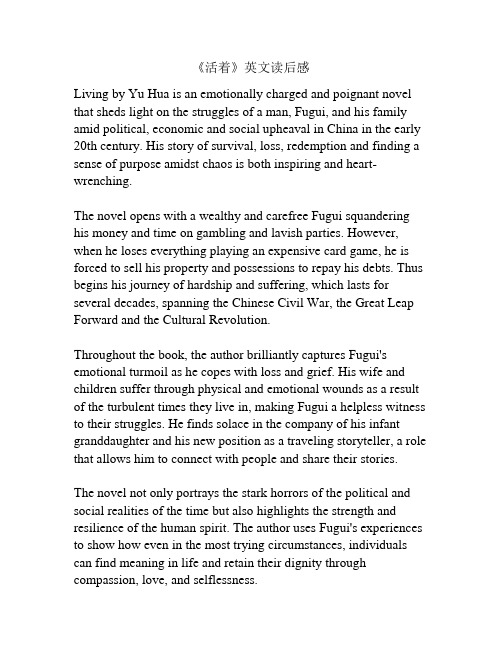
《活着》英文读后感Living by Yu Hua is an emotionally charged and poignant novel that sheds light on the struggles of a man, Fugui, and his family amid political, economic and social upheaval in China in the early 20th century. His story of survival, loss, redemption and finding a sense of purpose amidst chaos is both inspiring and heart-wrenching.The novel opens with a wealthy and carefree Fugui squandering his money and time on gambling and lavish parties. However, when he loses everything playing an expensive card game, he is forced to sell his property and possessions to repay his debts. Thus begins his journey of hardship and suffering, which lasts for several decades, spanning the Chinese Civil War, the Great Leap Forward and the Cultural Revolution.Throughout the book, the author brilliantly captures Fugui's emotional turmoil as he copes with loss and grief. His wife and children suffer through physical and emotional wounds as a result of the turbulent times they live in, making Fugui a helpless witness to their struggles. He finds solace in the company of his infant granddaughter and his new position as a traveling storyteller, a role that allows him to connect with people and share their stories. The novel not only portrays the stark horrors of the political and social realities of the time but also highlights the strength and resilience of the human spirit. The author uses Fugui's experiences to show how even in the most trying circumstances, individuals can find meaning in life and retain their dignity through compassion, love, and selflessness.Fugui’s story is a reflection of the human condition, showing that life is fleeting, fraught with dangers and uncertainties, but it is also full of moments of hope and beauty. Despite the odds stacked against him, Fugui clings onto life and keeps pushing forward, finding ways to adapt to the challenges and transform himself into a better version of himself.Living is a deeply moving and powerful novel that left a profound impact on me. It is a reminder that the human spirit is unbreakable and that even in the darkest of times, there is always hope. Fugui’s journey from a selfish and destructive gambler to a compassionate and wise storyteller is a testament to the resilience and transformative power of the human mind and spirit.In conclusion, Living by Yu Hua is a masterpiece of literature that deserves to be read and cherished by all. It is a powerful and touching tribute to the human capacity to survive and grow, even in the most challenging circumstances. The novel is a poignant and heartbreaking reminder of the resilience of the human spirit, making it an unforgettable reading experience.。
活着英文读后感80词左右

活着英文读后感80词左右英文回答:To Live is a novel by Yu Hua that tells the story of Fugui, a landlord's son who is forced to become a peasant after the Communist Revolution. Throughout the novel, Fugui endures a series of hardships, including the death of his wife, children, and parents. Despite these tragedies, Fugui maintains his sense of humor and compassion, and ultimately finds redemption in his love for his grandson.To Live is a powerful and moving novel that explores the themes of life, death, and the human spirit. Yu Hua's writing is simple and direct, but it is also deeply evocative and poetic. To Live is a novel that will stay with you long after you finish it.中文回答:《活着》是余华的一部小说,讲述了富贵的故事,富贵是一个地主的儿子,在共产党革命后被迫成为一名农民。
在整部小说中,富贵经历了一系列的磨难,包括他妻子、孩子和父母的死亡。
尽管发生了这些悲剧,富贵仍然保持着他的幽默感和同情心,并最终在他对孙子的爱中找到了救赎。
《活着》是一部有力量且感人的小说,探讨了生、死和人性的主题。
《活着》读后感 英文版

Alive after readingTo Live is a novel written by the famous writer Yu Hua. Through narrating the life experience of the protagonist Fugui, it profoundly shows the impermanence and tenacity of life. After reading this novel, I was deeply touched by the theme and had a deeper reflection on life.First of all, the novel makes me feel the fragility and impermanence of life. Fugui's life was full of tragedy and pain. His family suffered one misfortune after another, and his family died one after another. Finally, he was left alone. This impermanence makes us deeply aware of the shortness and fragility of life, and makes us cherish every moment and seize every opportunity in life.Secondly, the novel also let me see the tenacity and tenacity of human nature. Although Fugui experienced countless hardships, he never gave up his love for life and his yearning for a better future. He has always maintained an optimistic attitude and is constantly looking for fun and meaning in life. This kind of tenacity and indomitable spirit is deeply moved, and it also makes us understand that no matter how many setbacks and difficulties we encounter, we should maintain confidence and love for life.In addition, the novel also let me have a deeper understanding of the reality of society and the complexity of human nature. In the novel, the society in which Fugui lives is full of poverty and injustice, and the ugliness and selfishness of human nature often appear. But even so, there are still people who maintain goodness and justice and use their own strength to change the status quo of society. This reality and complex human nature makes people think deeply, and also makes us pay more attention to the practical problems of society and do our part to improve society.To sum up, the novel "To Live" made me think more deeply about life, human nature and society. It made me realize the impermanence and fragility of life, and also let me see the tenacity and tenacity of human nature. At the same time, it also gives me a deeper understanding of the reality of society and the complexity of human nature. These thoughts and understandings make me cherish life and love life more, and also make me pay more attention to the practical problems of society and make my own contribution to society. Therefore, I believe that the novel "To Live" is not only a literary work, but also a classic that can inspire people and guide people to think about life.。
介绍喜欢的一本书《活着》英语作文
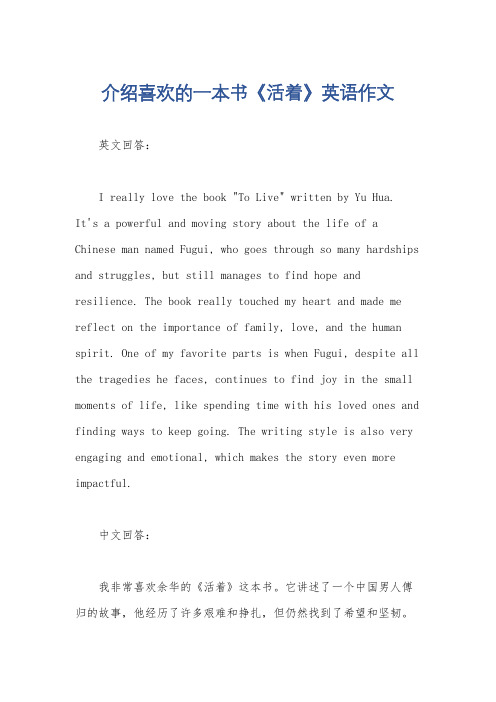
介绍喜欢的一本书《活着》英语作文英文回答:I really love the book "To Live" written by Yu Hua.It's a powerful and moving story about the life of a Chinese man named Fugui, who goes through so many hardships and struggles, but still manages to find hope and resilience. The book really touched my heart and made me reflect on the importance of family, love, and the human spirit. One of my favorite parts is when Fugui, despite all the tragedies he faces, continues to find joy in the small moments of life, like spending time with his loved ones and finding ways to keep going. The writing style is also very engaging and emotional, which makes the story even more impactful.中文回答:我非常喜欢余华的《活着》这本书。
它讲述了一个中国男人傅归的故事,他经历了许多艰难和挣扎,但仍然找到了希望和坚韧。
这本书真的触动了我的心灵,让我反思了家庭、爱和人性的重要性。
我最喜欢的部分之一是,傅归尽管面对种种悲剧,仍然能在生活的小细节中找到快乐,比如和家人在一起的时光,以及找到继续前行的方式。
《活着》英语读后感【三篇】
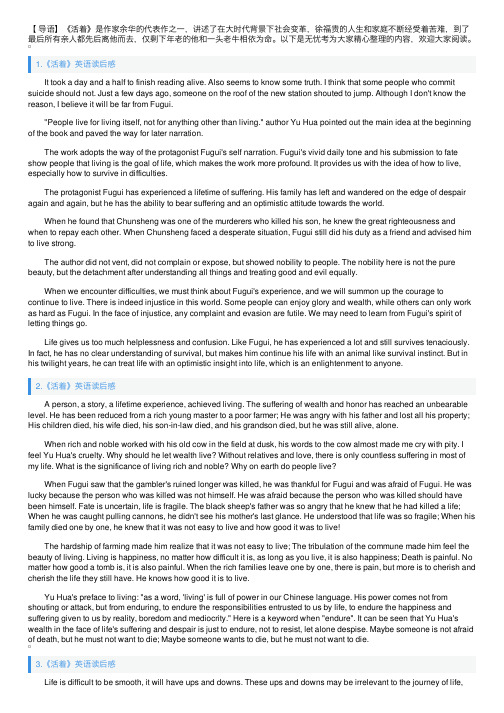
【导语】《活着》是作家余华的代表作之⼀,讲述了在⼤时代背景下社会变⾰,徐福贵的⼈⽣和家庭不断经受着苦难,到了最后所有亲⼈都先后离他⽽去,仅剩下年⽼的他和⼀头⽼⽜相依为命。
以下是⽆忧考为⼤家精⼼整理的内容,欢迎⼤家阅读。
1.《活着》英语读后感 It took a day and a half to finish reading alive. Also seems to know some truth. I think that some people who commit suicide should not. Just a few days ago, someone on the roof of the new station shouted to jump. Although I don't know the reason, I believe it will be far from Fugui. "People live for living itself, not for anything other than living." author Yu Hua pointed out the main idea at the beginning of the book and paved the way for later narration. The work adopts the way of the protagonist Fugui's self narration. Fugui's vivid daily tone and his submission to fate show people that living is the goal of life, which makes the work more profound. It provides us with the idea of how to live, especially how to survive in difficulties. The protagonist Fugui has experienced a lifetime of suffering. His family has left and wandered on the edge of despair again and again, but he has the ability to bear suffering and an optimistic attitude towards the world. When he found that Chunsheng was one of the murderers who killed his son, he knew the great righteousness and when to repay each other. When Chunsheng faced a desperate situation, Fugui still did his duty as a friend and advised him to live strong. The author did not vent, did not complain or expose, but showed nobility to people. The nobility here is not the pure beauty, but the detachment after understanding all things and treating good and evil equally. When we encounter difficulties, we must think about Fugui's experience, and we will summon up the courage to continue to live. There is indeed injustice in this world. Some people can enjoy glory and wealth, while others can only work as hard as Fugui. In the face of injustice, any complaint and evasion are futile. We may need to learn from Fugui's spirit of letting things go. Life gives us too much helplessness and confusion. Like Fugui, he has experienced a lot and still survives tenaciously. In fact, he has no clear understanding of survival, but makes him continue his life with an animal like survival instinct. But in his twilight years, he can treat life with an optimistic insight into life, which is an enlightenment to anyone.2.《活着》英语读后感 A person, a story, a lifetime experience, achieved living. The suffering of wealth and honor has reached an unbearable level. He has been reduced from a rich young master to a poor farmer; He was angry with his father and lost all his property; His children died, his wife died, his son-in-law died, and his grandson died, but he was still alive, alone. When rich and noble worked with his old cow in the field at dusk, his words to the cow almost made me cry with pity. I feel Yu Hua's cruelty. Why should he let wealth live? Without relatives and love, there is only countless suffering in most of my life. What is the significance of living rich and noble? Why on earth do people live? When Fugui saw that the gambler's ruined longer was killed, he was thankful for Fugui and was afraid of Fugui. He was lucky because the person who was killed was not himself. He was afraid because the person who was killed should have been himself. Fate is uncertain, life is fragile. The black sheep's father was so angry that he knew that he had killed a life; When he was caught pulling cannons, he didn't see his mother's last glance. He understood that life was so fragile; When his family died one by one, he knew that it was not easy to live and how good it was to live! The hardship of farming made him realize that it was not easy to live; The tribulation of the commune made him feel the beauty of living. Living is happiness, no matter how difficult it is, as long as you live, it is also happiness; Death is painful. No matter how good a tomb is, it is also painful. When the rich families leave one by one, there is pain, but more is to cherish and cherish the life they still have. He knows how good it is to live. Yu Hua's preface to living: "as a word, 'living' is full of power in our Chinese language. His power comes not from shouting or attack, but from enduring, to endure the responsibilities entrusted to us by life, to endure the happiness and suffering given to us by reality, boredom and mediocrity." Here is a keyword when "endure". It can be seen that Yu Hua's wealth in the face of life's suffering and despair is just to endure, not to resist, let alone despise. Maybe someone is not afraid of death, but he must not want to die; Maybe someone wants to die, but he must not want to die.3.《活着》英语读后感 Life is difficult to be smooth, it will have ups and downs. These ups and downs may be irrelevant to the journey of life,such as the approval of homework and the failure of quiz; It may also change your life trajectory, such as college entrance examination, employment However, no matter great joy or great sorrow, only when you are alive can you perceive all this, have the opportunity to taste the sweetness of the world and taste the suffering of the world. In the book, Chunsheng, a person who committed suicide rather than died for external factors, left a deep gray and cold impression on me. He didn't want to commit suicide when he was pulled into the army; In order to grab one or two big cakes and his face was black and blue, he didn't want to commit suicide; He ran away and was caught again and again. He didn't want to commit suicide. He knew that the war would eventually end. Even if it was dark around, there was still a glimmer of light in that distant place. He survived the war and finally chose to commit suicide. Perhaps, he fell from the position of county magistrate and was pointed out by thousands of people. His body and mind were devastated. The light in his heart was more distant than the end of the war. Anyway, he chose to end his life and victory came before his eyes. As Pushkin said in "if life deceives you", everything is fleeting, everything will pass... "Yes, all good, bad, happy and sad, as long as we are still alive, all these will be scattered to the end of the world by the river of time. The protagonist of this book, Fugui, gives people a positive color of life. His family was in decline. A landlord's childe became homeless, his relatives left him, and even kugen, his dependent grandson, died. The road ahead is miserable. Why should he live? Life is bleak, why "boil" the rest of the day? Why do you have to live in this tired world? After reading "alive", this problem has been bothering me and has no solution. After kugen's death, he didn't go to the vain distance with his deceased relatives, but lived alone in the world with old cow every day. Life is the basis of enjoying everything and the premise of creating a meaningful life. Fugui yearned for the future, full of longing for the unknown in the future, experienced many hardships and persevered, even when his relatives were far away from him, leaving him alone, even if there was only a cow as old as him. He was determined and determined to live. He hoped that the cow would become the last partner in his life journey. In his heart, there was a bright light that had not been blackened by that kind of suffering. Fugui still raised his head after crossing the robbery wave, the tenacity of smiling, the tenacity that will never be defeated by difficulties, and the indescribable desire for survival and life shocked my heart. Living is really a happy thing. Only living, can we have the opportunity to consider sadness and joy; Only alive can we judge success or failure; Only living, can we have the mood to taste honor and disgrace; Only when you are alive can you have the energy to understand life and death Only with life can we enjoy all this. It's good to be alive.。
活着书评(英文版)
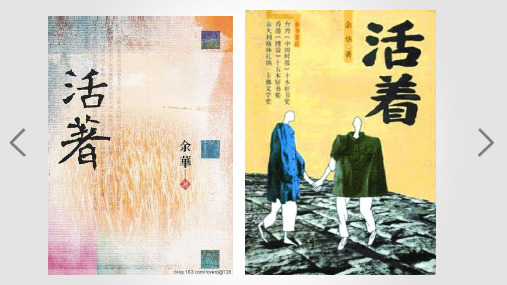
一个人命再大,要是自己想死,那就怎么也 活不了。
personal 3. The sentiments of us
From Fugui From Jiazhen From the theme
To be or not to be, that’s a question when your life at the end. Of course, it’s easy to end your own life. Maybe death is liberation for yourself, however, it also represent that you get out of your responsibility. People live in tough life in need of a big courage, which will meet more trouble and try their best to live. After reading this book, my heart is shocked. To be honest, it’s so regretful of our life. Anytime the disaster takes place, humans are always small as nothing compared with nature.
theme
From the
Nevertheless, humans are also determined when they meet the trouble. Living with disease and pain, but they just want to live. Living in the area where is so terrible, but they just want to live. With the desire that I want to live, they will fight against fate with courage.
余华活着英文读后感

余华活着英文读后感余华活着英文读后感认真读完一本名著后,相信大家一定领会了不少东西,是时候抽出时间写写读后感了。
那么你真的会写读后感吗?下面是小编为大家整理的余华活着英文读后感(精选5篇),仅供参考,大家一起来看看吧!余华活着英文读后感篇1The worst part of dying is not the one who leaves, but the one who is forced to accept it. Not only do they have more responsibility on their shoulders, but they also have fewer people to share with them.Fukki is such a sad living, his life is actually the epitome of hundreds of millions of people, all the suffering Chinese experienced nearly a hundred years in him clearly projected, he has a legendary life, but you wont have that legend.Fukki was a two generation, daily spend their savings at home, I do not know where the good fortune for a virtuous wife, is the daughter of mihang Chihepiaodu fukki, can still, not only lost property, but also the death of father, wife together with the belly of the child is also home to pick up only. The rest of his old mother, the young daughter of Feng Xia dependency, the fukki realized for the first time the hardships of life, fortunately, now after the birth of the second child with his son fukki Qing has returned to him. However, Felicity never turns out in pairs., Disasters pile up on one another. Fukki by the Kuomintang arrested young men on the way for a sick mother, was captured by the PLA, he returned home to find his mother has died, his wife Jean with a pair of children bear bitter hardships, but unfortunately the deaf daughter, son is clever and lively, laterbecause the county long Lady unexpectedly died of blood transfusion.After the cultural revolution, the great leap forward, representing the experience of natural disasters, Feng Xia and her husband died, a son of Feng Xia birth of the bitter root has not escaped the fate of the claws, finally only fukki a person, and a head of cattle and his namesake company, which is quite alone with a pregnant meaning, bleak. The sunset, already chuimu old man drove cattle further away, hoarse voice in the land at the end of the slowly rising juvenile to wander, middle-aged to dig hidden, old monk."Close this heavy blue book, the tears have wet eyes, let me not only filled with a thousand regrets variety of tragic hero experience, but because he has experienced so much, but still humble to live, he shall have been far beyond the scope of ordinary people can imagine.The worst part of dying is not the one who leaves, but the one who is forced to accept it. Not only do they have more responsibility on their shoulders, but they also have fewer people to share with them. But it is because of this that the living have to live more firmly, that is because they are carrying more than their own tomorrow.I enjoy living, living so good, living so happy. I have read "life" written by Yu Huas writer, telling the protagonist Xu Fuguis life, experiencing changes in Chinese history, social unrest, three years of natural disasters, the cultural revolution and so on. And your old age to life calm and natural attitude. Tell us that we live to live, not live to live for anything.When you are out of trouble, you feel alive, happy, alive, then you will feel frustrated, not terrible.When you help others, you feel the good life and the happy life, then you will feel how happy it is to help others.When you are successful, you feel what is good and happy in life, and then you will feel how proud you are to succeed.Hocking is an unfortunate and fortunate man, his love life, love life, so that when he was young he suffering from an incurable disease, break through all the difficulties, to become a great physicist, is the worlds praise. What made him so successful? He was optimistic about life and experience life.When a little tender tooth comes out of its branches, when a newborn child makes a loud cry. When the patient has recovered. When the fish play happily in the water, when the birds are in the branches, the hair sounds melodious. It feels good to live, happy to live. It all depends on the beauty of life, and the good life is always with us.Guo Moruo once said: "life and death is a thing on the line.". Life is struggle, death is rest. Life is active, death is sleep." Let us live happily, live happily.余华活着英文读后感篇2"Alive" is an old man named Fugui one day of his life miserable narration. In the past forty years, he experienced many sufferings in the world, faced with a four generation of persons death, he was supposed to die, but he is alive, or even just to live and live. As the author Yu Hua himself saidTo live is to live, and to live, not to live for anything. Your death, people are very confused, but he was alive, with the value of their own existence, have their own meaning of life, have their own immortality.The author only uses common narrative methods, but has a special rendering effect. The more I read, the heavier I feel. Theheaviness is not the result of the plot itself. But the writer uses the most common and even cold tone to describe unusual things. And the feeling that it was so heavy it just slipped into my heart. Therefore some people describe Yu Hua said he was a skilled surgeon in a leisurely manner the cruel nature of life from the false tao Ren stripped out.At first, he attracted me is your experience, namely the plot of the novel. Then the authors writing style and features. Until I saw the last, I read a book, then looked back at the authors introduction and other peoples comments. Ive got a new feeling.Back to the essence, Ive been thinking about whats the purpose of living. Just for writing a novel?. All kinds of people have different kinds of people. Some people say hes just trying to impress people on this book. Because reading is a psychological experience of fear. In fact, this implies another fact of Chinese Literature: realism, which uses realism as its slogan, is the last to dare to face reality. For example, essentially, human beings are alive without any meaning other than being alive. Then, if we must give meaning, then the only thing that counts, I am afraid that only the living itself. The great sense of living may have just come from here.Precisely because of this, "living" on a clear content, living in general understanding is a process, but, in fact, life is essentially a static state.Yu Hua wanted to tell the reader, "there is no happiness or misfortune in life. Life is just a matter of living, living quietly, and having a solitary sense.".[余华活着英文读后感]。
《活着》英语读后感
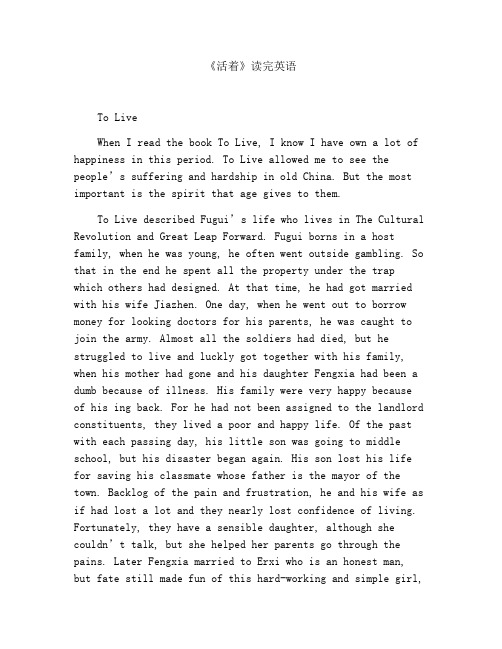
《活着》读完英语To LiveWhen I read the book To Live, I know I have own a lot of happiness in this period. To Live allowed me to see the people’s suffering and hardship in old China. But the most important is the spirit that age gives to them.To Live described Fugui’s life who lives in The Cultural Revolution and Great Leap Forward. Fugui borns in a host family, when he was young, he often went outside gambling. So that in the end he spent all the property under the trap which others had designed. At that time, he had got married with his wife Jiazhen. One day, when he went out to borrow money for looking doctors for his parents, he was caught to join the army. Almost all the soldiers had died, but he struggled to live and luckly got together with his family, when his mother had gone and his daughter Fengxia had been a dumb because of illness. His family were very happy becauseof his ing back. For he had not been assigned to the landlord constituents, they lived a poor and happy life. Of the past with each passing day, his little son was going to middle school, but his disaster began again. His son lost his life for saving his classmate whose father is the mayor of the town. Backlog of the pain and frustration, he and his wife as if had lost a lot and they nearly lost confidence of living. Fortunately, they have a sensible daughter, although she couldn’t talk, but she helped her parents go through the pains. Later Fengxia married to Erxi who is an honest man, but fate still made fun of this hard-working and simple girl,she died from giving birth. And then later, in the heavy blows, Fugui’s wife left him forever.Life had lost all his family, leaving him, last remaining alive. I don’t know how I can experience his life in that age, his disease that he had to face, but I know Fugui had learnt to respect for life, be properly alive.。
用余华的活着写一篇英语作文书评
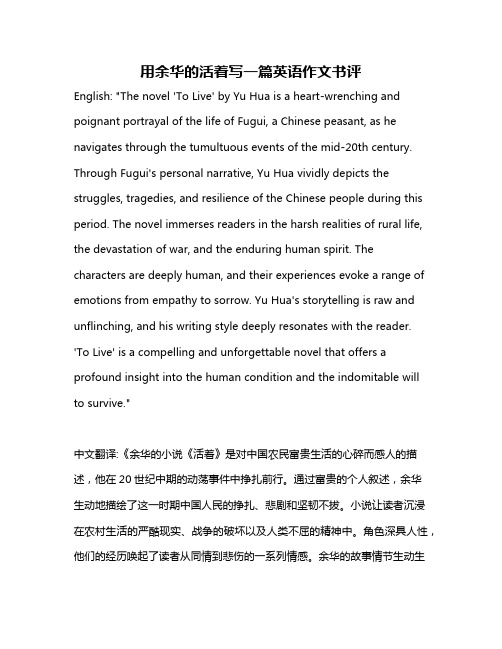
用余华的活着写一篇英语作文书评English: "The novel 'To Live' by Yu Hua is a heart-wrenching and poignant portrayal of the life of Fugui, a Chinese peasant, as he navigates through the tumultuous events of the mid-20th century. Through Fugui's personal narrative, Yu Hua vividly depicts the struggles, tragedies, and resilience of the Chinese people during this period. The novel immerses readers in the harsh realities of rural life, the devastation of war, and the enduring human spirit. The characters are deeply human, and their experiences evoke a range of emotions from empathy to sorrow. Yu Hua's storytelling is raw and unflinching, and his writing style deeply resonates with the reader.'To Live' is a compelling and unforgettable novel that offers a profound insight into the human condition and the indomitable willto survive."中文翻译:《余华的小说《活着》是对中国农民富贵生活的心碎而感人的描述,他在20世纪中期的动荡事件中挣扎前行。
用余华的活着写一篇英语作文书评

用余华的活着写一篇英语作文书评English:"Yu Hua's novel "To Live" tells the story of Fugui, a Chinese man who goes through the tumultuous events of the 20th century, including the Chinese Civil War, the land reform movement, the Great Leap Forward, and the Cultural Revolution. Through Fugui's experiences, the novel explores themes of family, resilience, survival, and the impact of historical events on ordinary people's lives. The storytelling is gripping and emotional, capturing the hardships and losses faced by Fugui and his family as they struggle to adapt to rapidly changing political and social landscapes. Yu Hua's writing is poignant and powerful, offering a poignant commentary on the human condition and the enduring spirit of the Chinese people. Overall, "To Live" is a compelling and thought-provoking novel that sheds light on the complexities of China's history and the resilience of its people."Translated content:余华的小说《活着》讲述了一个中国人富贵在20世纪经历了动荡事件,包括中国内战,土地改革运动,大跃进和文化大革命。
活着书评英语作文
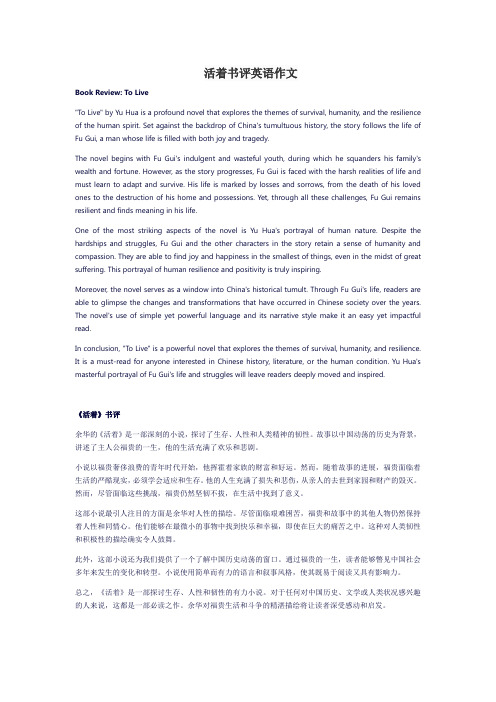
活着书评英语作文Book Review: To Live"To Live" by Yu Hua is a profound novel that explores the themes of survival, humanity, and the resilience of the human spirit. Set against the backdrop of China's tumultuous history, the story follows the life of Fu Gui, a man whose life is filled with both joy and tragedy.The novel begins with Fu Gui's indulgent and wasteful youth, during which he squanders his family's wealth and fortune. However, as the story progresses, Fu Gui is faced with the harsh realities of life and must learn to adapt and survive. His life is marked by losses and sorrows, from the death of his loved ones to the destruction of his home and possessions. Yet, through all these challenges, Fu Gui remains resilient and finds meaning in his life.One of the most striking aspects of the novel is Yu Hua's portrayal of human nature. Despite the hardships and struggles, Fu Gui and the other characters in the story retain a sense of humanity and compassion. They are able to find joy and happiness in the smallest of things, even in the midst of great suffering. This portrayal of human resilience and positivity is truly inspiring.Moreover, the novel serves as a window into China's historical tumult. Through Fu Gui's life, readers are able to glimpse the changes and transformations that have occurred in Chinese society over the years. The novel's use of simple yet powerful language and its narrative style make it an easy yet impactful read.In conclusion, "To Live" is a powerful novel that explores the themes of survival, humanity, and resilience. It is a must-read for anyone interested in Chinese history, literature, or the human condition. Yu Hua's masterful portrayal of Fu Gui's life and struggles will leave readers deeply moved and inspired.《活着》书评余华的《活着》是一部深刻的小说,探讨了生存、人性和人类精神的韧性。
书评英语作文活着

书评英语作文活着In the vast canvas of Chinese literature, "To Live" by Yu Hua stands out as a powerful narrative that explores the resilience of the human spirit and the meaning of life amidst the harshest of circumstances. Published in 1993, this novel tells the story of Fu Gui, a普通 Chinese farmer who, through a series of tragic events, is forced to question his existence and the value of life itself.The book opens with Fu Gui's gambling addiction that leads to the loss of his entire estate, followed by the death of his father. This sets the tone for the series of misfortunes that Fu Gui and his family will endure throughout the novel. However, instead of succumbing to despair, Fu Gui persists in finding meaning in his life, even in the face of death and despair.The narrative style of "To Live" is both simple and profound, reflecting the ordinary life of Chinese peasants and the profound truths they embody. Yu Hua's use of everyday language and dialogues gives the novel a strong sense of authenticity, making the reader feel as if they are a part of Fu Gui's world. The characters, while two-dimensional, are relatable and their struggles resonate deeply with the reader.The themes explored in "To Live" are universal and timeless. The question of life's meaning and the pursuit of happiness are explored through the lives of Fu Gui and his family, who despite their misfortunes, never lose sight of the small joys and hope that keep them going. The novel also highlights the resilience of the human spirit and the ability to adapt to any situation, showing that life, even in its harshest forms, can still be worth living.The impact of "To Live" on Chinese literature and culture is immense. It has been translated into multiple languages and has won numerous awards, including theItalian International Prize for Literature and the French Literary Prize for Foreign Works. The novel has also been adapted into a film, directed by Zhang Yimou, which further expanded its reach and influence.In conclusion, "To Live" is a must-read for anyone interested in Chinese literature and humanistic themes. It is a powerful testament to the resilience of the humanspirit and a reminder of the importance of finding meaningin even the most difficult of circumstances. Yu Hua's masterful storytelling and profound insights into the human condition make this novel a timeless classic that will continue to inspire and move readers for generations.**《活着》书评:生命的意义与坚韧的力量**在中国文学的浩渺长河中,《活着》这部作品以其对人性的深入挖掘和对生命的深刻反思,独树一帜。
活着电影影评英语作文
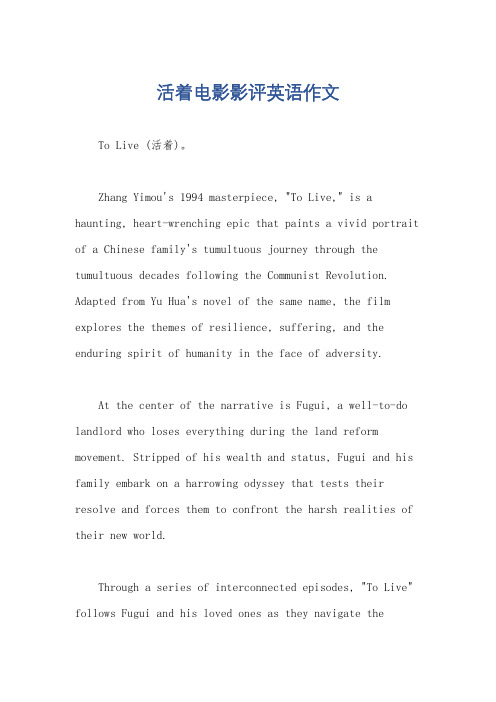
活着电影影评英语作文To Live (活着)。
Zhang Yimou's 1994 masterpiece, "To Live," is a haunting, heart-wrenching epic that paints a vivid portrait of a Chinese family's tumultuous journey through the tumultuous decades following the Communist Revolution. Adapted from Yu Hua's novel of the same name, the film explores the themes of resilience, suffering, and the enduring spirit of humanity in the face of adversity.At the center of the narrative is Fugui, a well-to-do landlord who loses everything during the land reform movement. Stripped of his wealth and status, Fugui and his family embark on a harrowing odyssey that tests their resolve and forces them to confront the harsh realities of their new world.Through a series of interconnected episodes, "To Live" follows Fugui and his loved ones as they navigate thepolitical upheavals and social transformations of the time. They endure famine, illness, and the loss of their children. Yet, even amidst unspeakable suffering, they find solace in the bonds of family and the indomitable spirit that keeps them going.Zhang Yimou's direction is both unflinching and compassionate, capturing the raw emotions and grimtragedies that mark Fugui's journey. The film's stark cinematography and minimalist aesthetic convey a sense of both historical realism and emotional immediacy.Ge You delivers a tour-de-force performance as Fugui, portraying the character's transformation from a carefree landowner to a broken and resilient survivor. His performance embodies the film's central theme of resilience, showcasing the human capacity to endure and persevere evenin the darkest of times."To Live" is not merely a tale of hardship and suffering. It is a testament to the indomitable humanspirit and the transformative power of hope. ThroughFugui's journey, Zhang Yimou explores the complexities of human existence, highlighting both the fragility and the resilience of the human heart.The film's title, "To Live," carries multiple layers of meaning. It suggests not only the physical act of survival but also the pursuit of a meaningful life despite adversity. Fugui and his family's determination to endure and find joy in the face of countless challenges embodies the essence of what it means to "live" in the truest sense of the word."To Live" is a cinematic masterpiece that transcends cultural and geographical boundaries. It is a timelessstory of love, loss, and the enduring power of the human spirit. Zhang Yimou's poignant storytelling and Ge You's exceptional performance combine to create a film that is both emotionally resonant and thought-provoking. As audiences witness Fugui's arduous journey, they are reminded of the fragility of human existence and the importance of embracing life's fleeting moments with gratitude and resilience.。
活着 读后感 英文

活着读后感英文"Alive" Reading Reflection"Alive" is a powerful and moving novel written by Piers Paul Read, which tells the incredible true story of a group of survivors of a plane crash in the Andes mountains. After their plane goes down, the survivors are left to fend for themselves in the harsh and unforgiving environment. The novel explores themes of survival, hope, and the resilience of the human spirit.One of the most striking aspects of "Alive" is the way it delves into the depths of human endurance. The survivors are faced with unimaginable challenges, from extreme cold and hunger to the emotional trauma of losing friends and family in the crash. Despite these hardships, they refuse to give up, drawing on their inner strength and determination to keep going. This portrayal of the indomitable human spirit is both inspiring and thought-provoking, reminding readers of the incredible resiliencethat lies within each of us.The novel also raises profound questions about the nature of survival and the lengths to which people will goin order to stay alive. As the survivors struggle to find food and shelter in the desolate landscape, they are forced to confront the moral and ethical dilemmas that arise in such extreme circumstances. The choices they make, and the sacrifices they are willing to endure, force readers to consider what they themselves would do in similar situations. This exploration of the human capacity for survival is both gripping and unsettling, prompting readers to reflect on their own values and beliefs.In addition to its exploration of survival, "Alive"also offers a poignant meditation on the power of hope. Despite the seemingly insurmountable odds stacked against them, the survivors refuse to give in to despair. Instead, they cling to the belief that they will be rescued, drawing strength from their faith and determination. This unwavering hope serves as a guiding light for the survivors, sustaining them through the darkest moments of their ordeal.It is a powerful reminder of the resilience of the human spirit and the ability of hope to sustain us in even the most dire circumstances.Finally, "Alive" is a testament to the strength of the human bonds that unite us. As the survivors struggle to stay alive, they draw on the support and camaraderie of their fellow passengers, forming deep and lasting connections that sustain them through their ordeal. Their ability to come together in the face of adversity is a testament to the power of human connection and the ways in which we can draw strength from one another in times of crisis.In conclusion, "Alive" is a gripping and emotionally resonant novel that offers a profound exploration of the human capacity for survival, hope, and resilience. Through its portrayal of the survivors' harrowing ordeal, it prompts readers to reflect on their own values and beliefs, and to consider the depths of their own inner strength. It is a powerful reminder of the indomitable nature of the human spirit and the ways in which hope and humanconnection can sustain us through even the most challenging of circumstances.。
书评英语作文活着
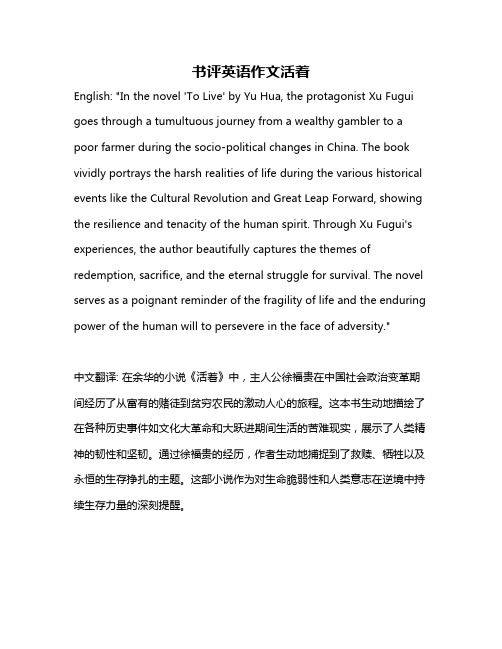
书评英语作文活着English: "In the novel 'To Live' by Yu Hua, the protagonist Xu Fugui goes through a tumultuous journey from a wealthy gambler to a poor farmer during the socio-political changes in China. The book vividly portrays the harsh realities of life during the various historical events like the Cultural Revolution and Great Leap Forward, showing the resilience and tenacity of the human spirit. Through Xu Fugui's experiences, the author beautifully captures the themes of redemption, sacrifice, and the eternal struggle for survival. The novel serves as a poignant reminder of the fragility of life and the enduring power of the human will to persevere in the face of adversity."中文翻译: 在余华的小说《活着》中,主人公徐福贵在中国社会政治变革期间经历了从富有的赌徒到贫穷农民的激动人心的旅程。
这本书生动地描绘了在各种历史事件如文化大革命和大跃进期间生活的苦难现实,展示了人类精神的韧性和坚韧。
用余华的活着写一篇英语作文书评

Review of "To Live" by Yu HuaIn the vast landscape of Chinese literature, "To Live" by Yu Hua stands out as a profound and heart-wrenching narrative that explores the resilience of the human spirit against the backdrop of historical and personal tragedies. This novel, first published in 1993, has gained worldwide recognition for its poignant portrayal of life in China during the 20th century.The story revolves around the fortunes and misfortunesof the Fu family, particularly their patriarch, Fu Gui. Through Fu Gui's eyes, readers witness the ups and downs of his life, from his prosperous beginnings as a wealthy landowner's son to his eventual impoverishment and near-death experiences. These shifts in fortune are not mere happenstance; they are driven by the forces of history, war, politics, and natural disasters.Yu Hua's writing style is both sparse and powerful. He avoids grandiose language and instead opts for a plain, almost conversational tone that allows the reader toconnect deeply with the characters and their struggles.This approach is particularly effective in portraying theemotional toll of war and loss. For instance, when Fu Gui's son is killed in battle, the narrative is devoid ofhysteria or excessive mourning; instead, it captures the numbness and despair that often accompany such losses.The novel also explores themes of family, love, and responsibility. Despite the many tragedies that strike the Fu family, they remain united, clinging to each other for support. This unity is particularly evident in the relationship between Fu Gui and his wife, who, despitetheir differences and hardships, remain committed to each other until the end.What makes "To Live" particularly noteworthy is its refusal to romanticize or sentimentalize the characters' lives. Even in the face of extraordinary adversity, the characters maintain a stubborn refusal to give up, an attitude that Yu Hua captures beautifully. This resilience is not seen as a form of heroism but as a necessarysurvival mechanism. It is this unflinching realism that gives the novel its enduring power.The translation of "To Live" into English has also been praised for its faithfulness to the original text. Thetranslator, Ha Jin, has managed to capture the essence ofYu Hua's writing while maintaining the emotional andcultural resonance of the original. This translation has allowed a wider audience to appreciate the beauty and depth of Yu Hua's work.In conclusion, "To Live" is a profound exploration of human resilience and the complexities of life in China during a tumultuous century. Yu Hua's sparse yet powerful writing style and unflinching realism make this novel amust-read for anyone interested in Chinese literature orthe human condition. The translation into English hasfurther broadened its impact, making it a global phenomenon that continues to resonate with readers around the world.**《活着》书评**在中国文学的广袤天地中,余华的《活着》以其深刻而令人心碎的叙述脱颖而出,探讨了在历史和个人悲剧背景下人类精神的韧性。
活着书评(英文版)

小说的叙述者“我”遇到那位名叫福贵的老人,听他讲述了自己坎坷的人生经 历: 地主少爷福贵嗜赌成性,终于赌光了家业一贫如洗,后来被国民党部队 抓了壮丁,又被解放军所俘虏,回到家乡他才知道母亲已经过世,妻子家珍含 辛茹苦带大了一双儿女,但女儿不幸变成了哑巴。
Since then, Jiazhen suffered from rickets so that she cannot do heavy work. What's more, their son was drew too much blood to save the wife of the head of county and
地主少爷福贵嗜赌成性终于赌光了家业一贫如洗后来被国民党部队抓了壮丁又被解放军所俘虏回到家乡他才知道母亲已经过世妻子家珍含辛茹苦带大了一双儿女但女儿不幸变成了哑巴
余 华
YU
HUA
主 题
1
内 容
2
感 想
3
1. The
theme
The novel shows us the process of the death of a person and how difficult in his life. Moreover, it shows us an attitude to the process of facing death. Living itself is difficult, to live itself must be hard to live. Because of that, you will find the profound meaning of life. Nothing is better than being alive, and nothing is more difficult than being alive for everyone.
活着书评英语版
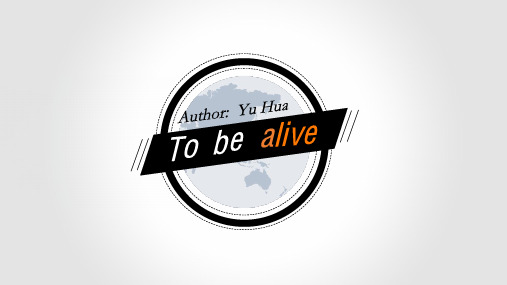
感想The personal
sentiments of us
From Fugui From Jiazhen From the theme
To be or not to be, that’s a question when your life at the end. Of course, it’s easy to end your own life. Maybe death is liberation for yourself, however, it also represent that you get out of your responsibility. People live in tough life in need of a big courage, which will meet more trouble and try their best to live. After reading this book, my heart is shocked. To be honest, it’s so regretful for the fragility of our life. Anytime the disaster takes place, humans are always small as nothing compared
真正的悲剧从此才开始渐次上演。家珍因患有软骨病而干不了重活;儿子因与县长夫人血型相 同,为救县长夫人抽血过多而亡;女儿凤霞与队长介绍的城里的偏头二喜喜结良缘,产下一男 婴后,因大出血死在手术台上;而凤霞死后三个月家珍也相继去世;外孙苦根便随福贵回到乡 下,生活十分艰难,就连豆子都很难吃上,福贵心疼便给苦根煮豆吃,不料苦根却因吃豆子撑 死……生命里难得的温情将被一次次死亡撕扯得粉碎,只剩得老了的福贵伴随着一头老牛在阳 光下回忆。
书本活着的英语
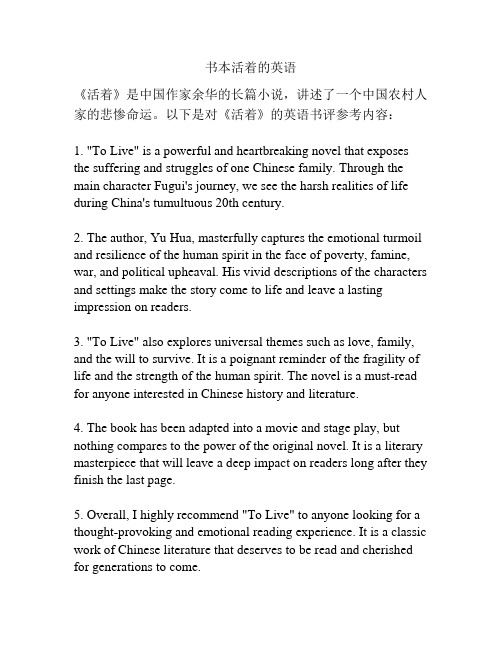
书本活着的英语《活着》是中国作家余华的长篇小说,讲述了一个中国农村人家的悲惨命运。
以下是对《活着》的英语书评参考内容:1. "To Live" is a powerful and heartbreaking novel that exposes the suffering and struggles of one Chinese family. Through the main character Fugui's journey, we see the harsh realities of life during China's tumultuous 20th century.2. The author, Yu Hua, masterfully captures the emotional turmoil and resilience of the human spirit in the face of poverty, famine, war, and political upheaval. His vivid descriptions of the characters and settings make the story come to life and leave a lasting impression on readers.3. "To Live" also explores universal themes such as love, family, and the will to survive. It is a poignant reminder of the fragility of life and the strength of the human spirit. The novel is a must-read for anyone interested in Chinese history and literature.4. The book has been adapted into a movie and stage play, but nothing compares to the power of the original novel. It is a literary masterpiece that will leave a deep impact on readers long after they finish the last page.5. Overall, I highly recommend "To Live" to anyone looking for a thought-provoking and emotional reading experience. It is a classic work of Chinese literature that deserves to be read and cherished for generations to come.。
- 1、下载文档前请自行甄别文档内容的完整性,平台不提供额外的编辑、内容补充、找答案等附加服务。
- 2、"仅部分预览"的文档,不可在线预览部分如存在完整性等问题,可反馈申请退款(可完整预览的文档不适用该条件!)。
- 3、如文档侵犯您的权益,请联系客服反馈,我们会尽快为您处理(人工客服工作时间:9:00-18:30)。
liberation for yourself, however, it also represent that you get
From out of your responsibility. People live in tough life in need of a big courage, which will meet more trouble and try their best to live.
内容The Novel
To Be Alive,which tells a story of a person's life, is not only a
life testimonials of an old man suffered a worldly vicissitudes
and tribulations, but a drama of life or deal. The narrator of
Jiazhen
Jiazhen is a work–hard, industrious, kindly, and virtuous woman. She shared happiness and sorrow with her husband Fugui, who is one of the important spiritual supports of Fugui. When the husband gambled away all his fortune, Jiazhen persuaded her husband to quit the gambling, but he didn't listen to her so that she left him to go back her former home with her daughter. When she heard that Fugui had completely given up gambling, she went back to his side through thick and thin. She wanted nothing but a peace life.
主 作 人 内 感 1
2
3
4
5
题 者 物 容想
主题The theme
The novel To Be Alive is a watershed in Yu Hua's creation life. The novel shows us the process of the death of a person and how difficult in his life. Moreover, it shows us an attitude to the process of facing death. Living itself is difficult, to live itself must be hard to live. Because of that, you will find the profound meaning of life. Nothing is better than being alive, and nothing is more difficult than being alive for everyone.
passed away and unfortunately his daughter became dumb.
《活着》讲述一个人一生的故事,这是一个历尽世间沧桑和磨难老人的人生感 言,是一幕演绎人生苦难经历的戏剧。小说的叙述者“我”遇到那位名叫福贵 的老人,听他讲述了自己坎坷的人生经历: 地主少爷福贵嗜赌成性,终于赌 光了家业一贫如洗,后来被国民党部队抓了壮丁,又被解放军所俘虏,回到家 乡他才知道母亲已经过世,妻子家珍含辛茹苦带大了一双儿女,但女儿不幸变 成了哑巴。
Chronicle of a Blood Merchant have been named as two of
the top ten most influential books in China. In 2005, Hua
achieved China Book Special Contribution Award.
penniless. And then he was arrested by the Nationalist troops
to be a coolie, and later he was captured by the liberation army. When he returned to his hometown,his mother had
家珍是一位任劳任怨,勤劳、善良、贤惠的女子。她与福贵风雨同舟相濡以沫,是福贵“活着” 的一条重大精神支柱。当丈夫嗜赌把家财败光,家珍因劝其而不听,一气之下领着女儿回来娘 家。但就在福贵一无所有时,当她听说福贵已经彻底戒了赌之后,她又回到了福贵身边与他共 患难。她不贪图大福大贵,只想“过个安生日子”。
小说《活着》是余华创作中的分水岭。《活着》展现了一个又一个人 的死亡过程,掀起一波又一波无边无际的苦难波浪,表现了一种面对 死亡过程的可能的态度。活着本身很艰难,延续生命就得艰难的活着 ,正因为异常艰难,活着才具有深刻的含义。没有比活着更美好的事 ,也没有比活着更艰难的事。
作者The author
later, he changed his mind to start new life for his wife's coming back. He made his
lives and picked up the shadow play with his fellow villager Chunsheng. But he was
Jiazhen & Xu Fugui
Байду номын сангаас
Xu Fugui
Fugui was a heavy-gambling dude, who gambled all his fortune, which caused his
father dead and his pregnant wife with his daughter ran away from home. One year
真正的悲剧从此才开始渐次上演。家珍因患有软骨病而干不了重活;儿子因与县长夫人血型相 同,为救县长夫人抽血过多而亡;女儿凤霞与队长介绍的城里的偏头二喜喜结良缘,产下一男 婴后,因大出血死在手术台上;而凤霞死后三个月家珍也相继去世;外孙苦根便随福贵回到乡 下,生活十分艰难,就连豆子都很难吃上,福贵心疼便给苦根煮豆吃,不料苦根却因吃豆子撑 死……生命里难得的温情将被一次次死亡撕扯得粉碎,只剩得老了的福贵伴随着一头老牛在阳 光下回忆。
Yu Hua
Yu Hua, born in Hangzhou, Zhejiang Province, on April 3,
1960, was a modern writer in China. After graduating from
secondary school in 1977, he entered the Beijing Lu Xun
finally returned home safely but this mother has already died. However, his daughter
Fengxia also became dumb because of sickness.
福贵是一个嗜赌如命的纨绔子弟,把家底儿全输光了,老爹也被他气死了,怀孕的妻子带着女 儿离家出走,一年之后妻子回来之后,他洗心革面,重新开始了自己的生活。他和同村的春生 一起操起了皮影戏的营生,却被国民党军队拉去做了壮丁,后来又糊里糊涂的当了共产党的俘 虏。他们约定,一定要活着回去。历尽千辛万苦,他终于平安回到家中,但是此时母亲已去逝 ,女儿凤霞也因生病变哑了。
余华 1960年4月3日出生于浙江杭州,现代作家。 1977年中学毕业后,进入北京鲁迅文学院进修深造。 1983年开始写作,1984年开始发表小说。 《活着》和《许三观卖血记》同时入选百位批评家和文学编辑评选的九十年 代最具有影响的十部作品。 2005年获得中华图书特殊贡献奖。
人物The character
caught to be labor by Nationalist troops, and then goofed off to be the prisoner of
the communist party. They made sure to return alive. Through the hard struggle, he
the novel "I" encountered an old man named Fugui and
listened to him about his rough life experience: Master
landlord Fugui gambled away his family business and became
the
After reading this book, my heart is shocked. To be honest, it’s so regretful for the fragility of our life. Anytime the disaster
感想The personal sentiments of us
From Fugui From Jiazhen From the theme
To be or not to be, that’s a question when your life at the end.
Of course, it’s easy to end your own life. Maybe death is
